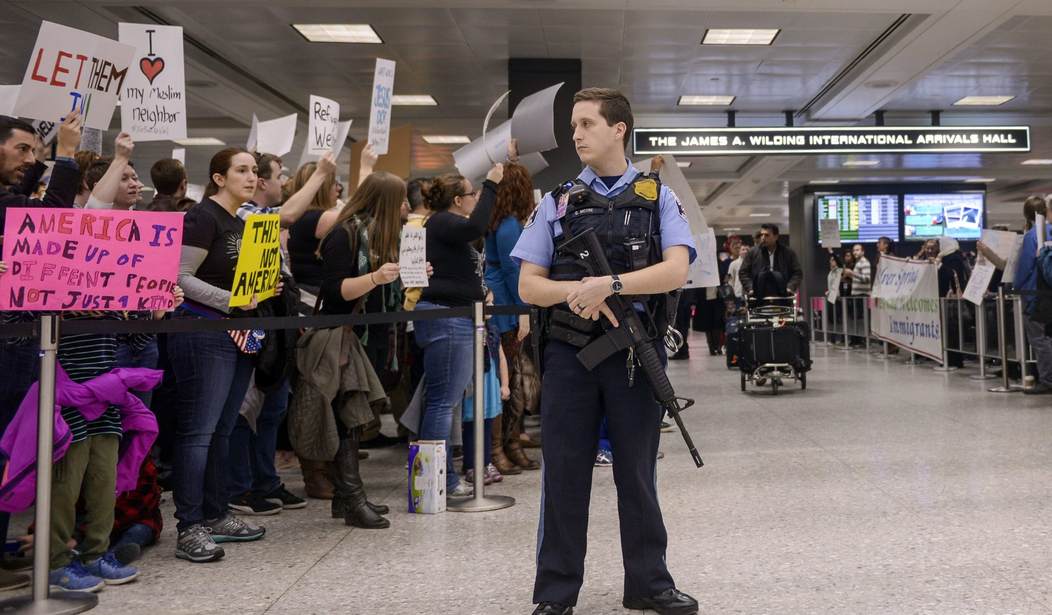As lawmakers joined protests against legal permanent U.S. residents and those with visas or refugee status being detained at U.S. airports, a federal judge issued an emergency stay against President Trump’s executive order.
That order, issued Friday, stopped entrance to the United States from a handful of Muslim-majority countries — Iraq, Iran, Libya, Somalia, Sudan, Syria and Yemen — and froze the refugee resettlement program.
“It’s not a Muslim ban, but we were totally prepared. It’s working out very nicely. You see it at the airports, you see it all over,” Trump told reporters in the Oval Office late Saturday afternoon.
Three hours later, U.S. District Judge Ann Donnelly in the Eastern District of New York heard arguments on behalf of two Iraqi men detained at JFK airport: Hameed Khalid Darweesh, who worked for the U.S. military in Iraq, and Haider Sameer Abdulkaleq Alshawi, whose wife did the same and was granted a visa to join his wife and son already here on refugee status.
“Because the executive order is unlawful as applied to petitioners, their continued detention based solely on the executive order violates their Fifth Amendment procedural and substantive due process rights,” the ACLU, International Refugee Assistance Project, National Immigration Law Center, and The Jerome N. Frank Legal Services Organization argued in a filing on behalf of the two men, which was expanded to a class-action motion.
The filing says Darweesh, who was granted a special immigrant visa after threats to his life because of a decade of service to the U.S. military and contractors and was trying to travel to Charlotte, was detained in New York and when his attorneys asked Customs and Border Patrol “who is the person to talk to?” about seeing their client the CBP agents responded, “Mr. President. Call Mr. Trump.”
Donnelly based her stay of Trump’s order on “strong likelihood of success in establishing that the removal of the petitioner and others similarly situated violates their rights to Due Process and Equal Protection guaranteed by the United States Constitution” as well as “imminent danger that, absent the stay of removal, there will be substantial and irreparable injury to refugees, visa-holders, and other individuals from nations subject to the January 27, 2017 Executive Order.”
There were two more federal cases: In Washington state, U.S. District Judge Thomas Zilly ordered the government to not deport two unnamed people pending a Feb. 3 hearing. In U.S. District Court for the Eastern District of Virginia, Judge Leonie Brinkema blocked deportations of valid visa-holders for the next seven days and ordered that lawyers be granted access to “all legal permanent residents being detained at Dulles International Airport.”
Reuters reported that state attorneys general in Pennsylvania, Washington and Hawaii were also determining taking their own legal actions against Trump’s order.
Activists reported that hours after the order was issued, CBP still wasn’t granting access to the Dulles detainees. Sen. Cory Booker (D-N.J.) joined protesters at the airport:
Sen. Booker says he believes Customs and Border Protection violated court order at #Dulles pic.twitter.com/lsPkk7iS6O
— Rachel Kurzius (@Curious_Kurz) January 29, 2017
Some detainees began to be released after midnight:
RT yjtorbati: The moment some of those detained emerged from detention here in Dulles pic.twitter.com/qj0B1UGUFZ
— Sonya Mavis (@marvelousonya) January 29, 2017
CNN reported that Trump advisers Steven Bannon and Stephen Miller overrode Department of Homeland Security guidance that people with permanent legal U.S. residence, even from the seven banned countries, were protected under the law. Airlines were told “lawful permanent residents are not included and may continue to travel to the USA.” The order reportedly did not go through the agency review process, including a check by the Justice Department’s Office of Legal Counsel.
Some Republican senators sounded off against Trump’s order. Sen. Ben Sasse (R-Neb.) said that “while not technically a Muslim ban, this order is too broad.”
“There are two ways to lose our generational battle against jihadism by losing touch with reality. The first is to keep pretending that jihadi terrorism has no connection to Islam or to certain countries. That’s been a disaster,” Sasse said in a statement Saturday. “And here’s the second way to fail: If we send a signal to the Middle East that the U.S. sees all Muslims as jihadis, the terrorist recruiters win by telling kids that America is banning Muslims and that this is America versus one religion. Both approaches are wrong, and both will make us less safe. Our generational fight against jihadism requires wisdom.”
Sen. Jeff Flake (R-Ariz.) said Trump and his administration “are right to be concerned about national security, but it’s unacceptable when even legal permanent residents are being detained or turned away at airports and ports of entry.”
“Enhancing long term national security requires that we have a clear-eyed view of radical Islamic terrorism without ascribing radical Islamic terrorist views to all Muslims,” Flake said.
Senate Minority Leader Chuck Schumer (D-N.Y.) said he called Homeland Security Secretary John Kelly on Saturday “to urge the administration to rescind these anti-American executive actions that will do absolutely nothing to improve our safety.”
“These executive orders were mean-spirited and un-American in their origin, and implemented in a way that has caused chaos and confusion across the country,” Schumer said. “They will only serve to embolden and inspire those around the globe who would do us harm. They must be reversed, immediately.”









Join the conversation as a VIP Member